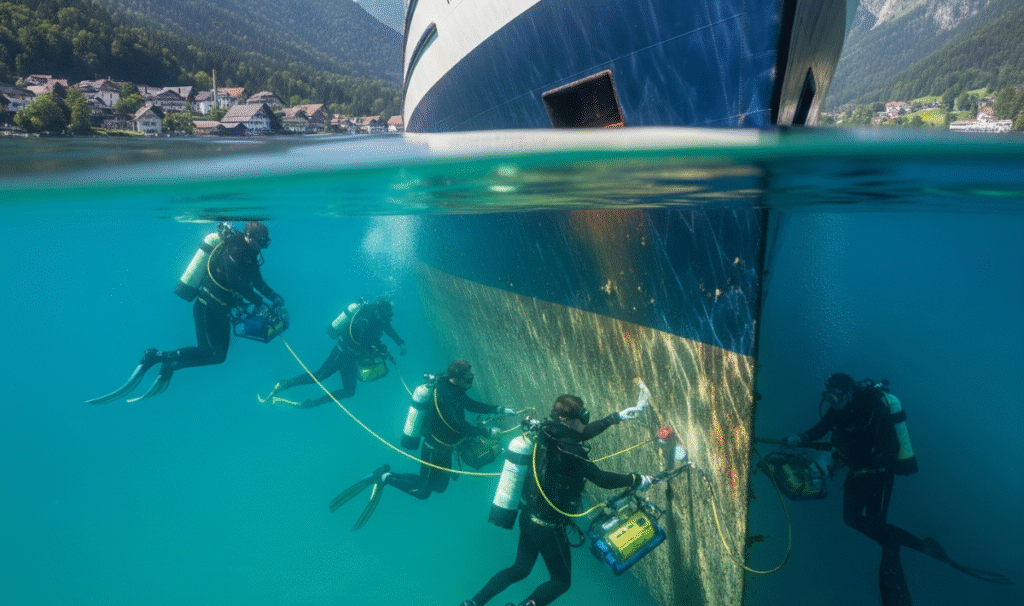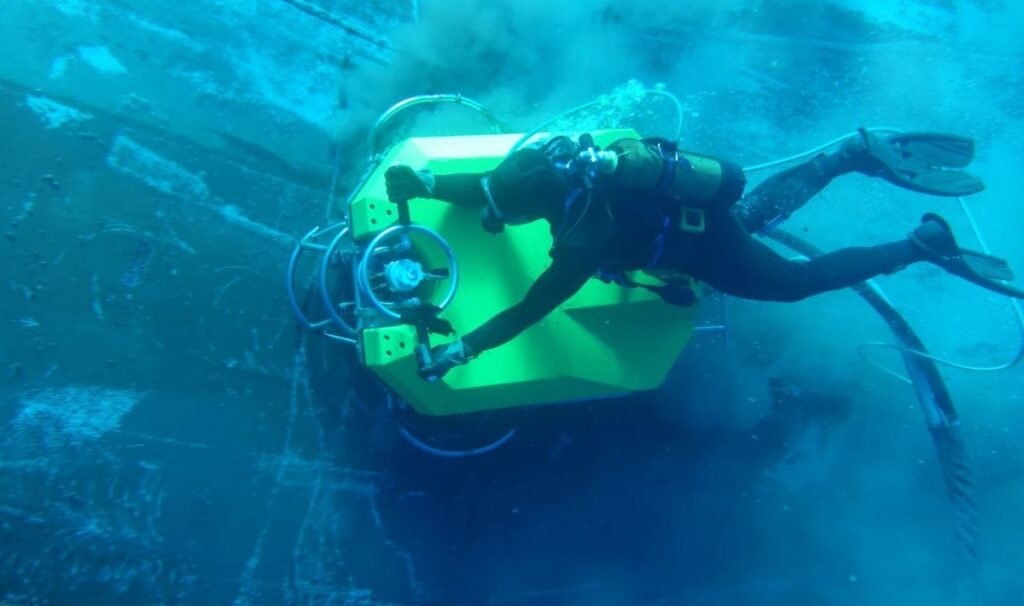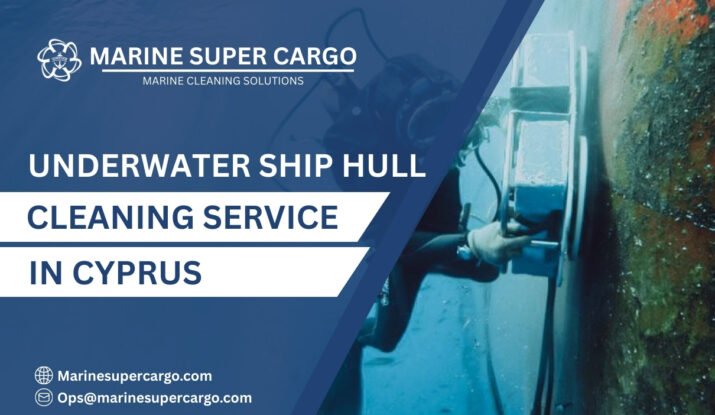Imagine your vessel cutting through the shimmering waters off Cyprus with the grace of a dolphin—fast, smooth, and efficient. Now picture that sleek ship slowed down by barnacles, algae, and marine growth clinging stubbornly to its underwater surfaces. That slow drag saps fuel, raises costs, and threatens your schedule. This is why underwater ship hull cleaning in Cyprus is an indispensable tool for smart ship owners and operators who want to keep their vessels swift and sustainable.
Cyprus, located at the crossroads of Europe, Asia, and Africa, hosts major shipping routes and bustling ports like Limassol and Larnaca. Its warm Eastern Mediterranean environment encourages rapid biofouling, making underwater ship hull cleaning a must for vessels that call here. With rising fuel prices and stricter environmental regulations, proactive maintenance below the waterline has never been more critical.
Why Underwater Ship Hull Cleaning in Cyprus is Essential
Impact on Fuel Efficiency and Operating Costs
Picture trying to swim in a wetsuit glued to your skin—this is how a fouled hull affects your ship’s movement through water. Even a small algae layer or barnacle patch can increase drag significantly, leading to 10–20% higher fuel consumption. Over time, this adds up to thousands of dollars lost per voyage. Regular underwater cleaning reduces this drag, saving you fuel costs and extending your vessel’s operating life.
Environmental Protection and Regulatory Compliance for Underwater Ship Hull Cleaning in Cyprus
Cyprus aligns with International Maritime Organization (IMO) guidelines, emphasizing biofouling management to prevent invasive species from spreading via ship hulls. Cleaning providers in Cyprus use eco-conscious methods with waste capture to safeguard the marine ecosystem around this beautiful island. Compliance with these regulations is paramount: clean hulls, clean conscience.

Marine Growth and Biofouling in Cyprus’ Coastal Waters
Common Fouling Organisms in the Eastern Mediterranean
Cyprus’ waters are a hotspot for marine life such as barnacles, mussels, algae, and tubeworms, all quick to colonize ship hulls. The temperate yet warm climate accelerates this growth, especially during calm-sea months. This natural buildup roughens hull surfaces, increasing drag and raising fuel costs. Adhering to environmental standards like MARPOL and industry best practices from the IMCA helps vessel operators manage fouling responsibly, reducing both operational costs and ecological risks in the Eastern Mediterranean.
Modern Techniques and Technologies for Underwater Ship Hull Cleaning in Cyprus
Diver-Based Hull Cleaning Services
Experienced divers form the first line of cleaning defense, skillfully scraping and brushing off marine growth while preserving delicate anti-fouling coatings.
Robotic and ROV Cleaning Systems
Robots and remotely operated vehicles (ROVs) equipped with rotary brushes and cameras are increasingly popular in Cypriot ports. These machines deliver precise cleaning, can access hard-to-reach areas, and reduce risks to divers, especially in rough conditions or complex hull geometries.
Advanced Tools: Brush Karts and High-Pressure Jets
Innovations like hydraulic brush karts, which are remotely steered by divers, combine effective fouling removal with protection for hull coatings. High-pressure water jets are employed to tackle stubborn deposits without abrasive damage, with waste containment systems ensuring environmental safety.
Leading Ports and Service Providers for Underwater Ship Hull Cleaning in Cyprus
Limassol and Larnaca dominate the scene with companies like Cleaniship.co, providers that leverage cutting-edge technology and deep local expertise to meet the needs of commercial, cargo, and leisure vessels. Cyprus’ ports offer seamless clearance and prompt service, minimizing your vessel’s time in port.
Step-by-Step Process of Underwater Ship Hull Cleaning in Cyprus
- Pre-Cleaning Inspection: Divers or ROVs perform video surveys to assess fouling types and hull condition.
- Safety and Coordination: The vessel’s crew and cleaning team agree on procedures, communication protocols, and safety checks.
- Fouling Removal: Divers or robots employ brushes, scrapers, and water jets tailored to fouling severity and hull coatings.
- Waste Capture and Disposal: Removed biofouling and debris are collected using filtration or suction to prevent pollution.
- Post-Cleaning Inspection and Reporting: Detailed reports with video documentation ensure compliance and inform maintenance planning.
How to Choose a Reliable Provider for Underwater Ship Hull Cleaning in Cyprus
Look for providers who:
- Hold certifications from IACS or recognized maritime bodies.
- Use modern technology, including ROVs and brush karts.
- Follow strict environmental protocols with effective waste management.
- Have positive testimonials and transparent, upfront pricing.
- Provide comprehensive inspection and reporting services.
Benefits of Regular Underwater Ship Hull Cleaning in Cyprus
- Reduced fuel consumption and emissions thanks to smoother hull surfaces.
- Improved operational speed and schedule reliability.
- Extended lifespan of anti-fouling paint and hull materials.
- Compliance with international and Cypriot environmental regulations.
- Early detection of damage or corrosion lowers repair costs.

Environmental Best Practices and Compliance
Cypriot hull cleaning operators prioritise environmental safety by using closed-loop waste collection, biodegradable brushes, and adherence to IMO biofouling management guidelines. These best practices protect Cyprus’ rich marine biodiversity and national reputation as a responsible maritime hub.
Conclusion: Keeping Your Vessel Efficient and Green in Cyprus’ Waters
Underwater ship hull cleaning in Cyprus is far more than routine maintenance—it’s the ace up every shipowner’s sleeve for saving fuel, cutting emissions, and staying compliant with evolving regulations. With Cyprus’s advanced facilities, expert diver teams, and growing use of robotics, your vessel can stay clean, fast, and environmentally friendly while navigating this vital maritime crossroads. Dive into professional hull cleaning and experience smoother, greener sailing in the Mediterranean.
FAQ:
Q1. How often should underwater ship hull cleaning be performed in Cyprus?
Typically, every 3 to 6 months, depending on fouling severity and operational profile.
Q2. Are robotic hull cleaning options readily available in Cypriot ports?
Yes, leading providers deploy ROVs and brush kart systems, especially in Limassol and Larnaca.
Q3. Can underwater ship hull cleaning damage the ship’s anti-fouling paint?
When done by trained divers or advanced robots, methods are designed to protect coatings while removing fouling.
Q4. Is it possible to clean the hull while the ship is at berth in Cyprus?
Yes, most hull cleaning is performed in-water at berth or anchorage, reducing downtime and costs.
Q5. How is biofouling waste managed during cleaning in Cyprus?
Waste is captured on-site using closed-loop systems and disposed of responsibly in compliance with environmental regulations.


